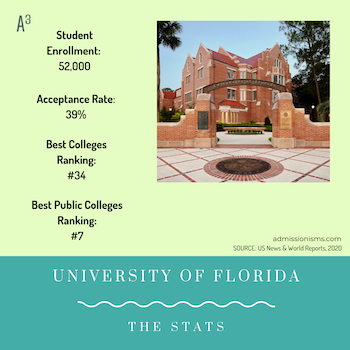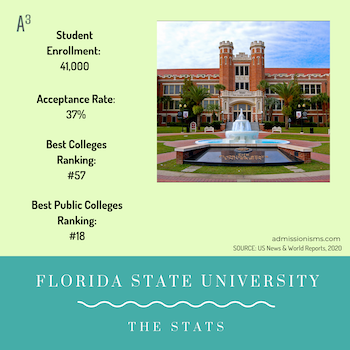
“Which is better: UF or FSU?” I’m often asked by parents looking for additional guidance in helping their kids shape their college application list.
University of Florida (UF) and Florida State University (FSU) have enjoyed a fierce decades-long rivalry – not just on the football field, but they are competing for acknowledgement as the “best college in the state of Florida.” Or as one of my friends put, “The Harvard of Florida.”
If you’re a Floridian, you also know that the University of Miami (UM) is a third party in the rivalry too. UM, also a nationally recognized university, is a private college, however, which a much larger cost of attendance. There are 10 other public colleges belonging to the Florida State University system, but UF and FSU are among the biggest, with the largest student bodies, most well-known throughout the rest of the country (thank the football teams), with extremely spirited alumni bases and lifelong fans.
Let’s go back to the original question: FSU vs UF: Which is the better college? Well…. for most people, the simplest determination is to compare numbers, but again, this ain’t football we’re talking here. It’s easy to rank teams based off of how many wins they have per season. When we’re talking colleges, it’s tempting to rely on the rankings, but a student’s best fit is not that simple or cut-and-dry.
I would NEVER advocate a parent send their child to a college because of a ranking. I’ll explain.
U.S. News and World Reports 2020 College Rankings
Every year, U.S. News & World Reports publishes its claim to fame “Best Colleges” lists. Along with several iterations, including Best Public Colleges, Best Value Colleges, Best in Undergraduate Teaching, Best in Major, and so on.
Many use these college rankings as a proxy for prestige or quality of education. Heck, colleges themselves will advertise their rankings this way – all over their brochures, emails, press releases, and websites. It’s great for marketing purposes. However, college rankings are NOT a clear side-by-side comparison of educational quality. Before we get to the WHY, let’s break down where they stand when you glance at the numbers.
Here’s where UF and FSU stand on newly published U.S. News & World Reports rankings for 2020. First up, let’s check out the University of Florida:

UF has also the claim to fame as the first university in the state of Florida to have cracked the top 10 best public college rankings list. This is a national ranking of best public colleges – as in, top in the country. It moved up a few slots this year.
Here’s Florida State University’s stats to compare. Let’s take a peek together:

In the 2020 edition, FSU actually tied for #57 best college nationally and #18 best public college in the nation alongside Penn State, Purdue, and Pittsburgh.
Have you ever wondered how these rankings are determined? What goes into determining where each college falls on these national lists? Maybe not, but I’m sort of a data geek, so you can bet that I have.
Some of the factors have very little to do with quality of education at all. College selectivity plays a role: the higher the average SAT/ACT scores, the higher the rankings. Arguably, this may be a reflection of the academic caliber of their students, but rather than reflecting the educational experience of the next 4 years, it instead tells how much hard work (and/or standardized test prep courses) took place during high school. It reflects very little on the quality of education received during the college years, job prospects, earning potential, or any of the other factors that squarely come to most students’ and parents’ minds when asking the “which is better” question in the first place.
Also, for a long time, college selectivity was the most heavily weighted factor that determined the national rankings. In other words, the lower the acceptance rate, the higher the ranking. Colleges that admitted only 10% of students versus 40% of students were automatically ranked higher. This has very little to do with educational quality, by the way. A record-breaking number of applications (as both FSU and UF experienced during the last application cycle), could mean that these college leapfrog up the college rankings lists.
So Which Is Better?
This is a trick question. Neither college is “better.” Certainly people have their favorites (which may or may not have to do with sports!) There is NOT a single “best colleges” ranking list that can tell you which college is a great fit for your student. NONE.
There’s a big picture view that must be kept top of mind at all times. Best fit is truly a composite of students’ academic, social/cultural, geographic, financial, and career preferences. EACH of these factors must be weighed before we can determine if there is a “best” fit.
As a college admissions consultant, this means getting to know each student, collecting their preferences, and parental observations to make key recommendations. It may very well be that NEITHER college is a great fit.
Here are some observations I share when asked the UF vs FSU question (it comes up a lot!):
- UF is the bigger school – as far as student enrollment goes. Both colleges have very large student populations, but maybe your student finds that one is just TOO BIG for their personal tastes.
- Both UF and FSU are located in small college towns, but in Gainesville (home of the Florida Gators), UF dominates the social scene; whereas in Tallahassee, you have another major state university (Florida Agricultural & Mechanical University) right there in town.
- Racial/cultural diversity is an important metric as well. It’s a good idea to take a view of that landscape, especially if the student belongs to a specific group that is important to him/her. Which one of these colleges is more diverse? Which one has student groups or organizations that your student may want to join to be an active part of that community? Here it stands to mention that Tallahassee (home of the Florida State Seminoles) has more in-city diversity due to the fact that a nationally renowed historically Black college, Florida Agricultural & Mechanical University (FAMU), is located just a few miles away.
- Intended major is another strong point of consideration. Both colleges have a wide, diverse set of college majors and program offerings, but it may be the case that the intended major isn’t offered at both, or there are clear advantages of choosing one other the other. UF, for example, has a world-class hospital directly on campus. For students taking a pre-medicine route, this would appear a clear winner, especially if collaborative student-faculty programs are on the table.
- Don’t forget the intangible factor of where the student most feels “at home.” After all, they will be spending the next 4 years living in this campus community. A campus visit may reveal everything you need to know as far as which one is the best fit for your student.
Long Story Short
The answer is neither college is objectively better. Quite frequently one (or both!) are on students’ college wish lists. Digging deeper to determine “why” is part of the job for me. Is it name recognition? Allegiance to long standing college rivalries (“Everyone in my family is a Gator!”)? Desire to utilize Florida Bright Futures Scholarship funds (which can be used at any in-state college)? Or are we chasing prestige via college rankings? Are there other, more important factors, that need to be in the driver’s seat in making a clear choice?
Your students’ best fit is a combination of several factors – and making recommendations means getting to know the student – what makes them tick, how they best learn, which social environment is a better fit (both UF and FSU have been known to appear on “party college” lists), and looking beyond the rankings – no matter how impressive they may appear at first glance.
What’s Next?
Are you a Floridian? Me too! Planning on utilizing the Florida Bright Futures Scholarship program to save tuition money? It’s a great deal if you qualify. Come check out our two-part Bright Futures series to explore how to close to gap on college costs and whether staying in-state is the right move for your student.

 My 2 Cents On The Celebrity College Admissions Scandal
My 2 Cents On The Celebrity College Admissions Scandal What Is An Independent Educational Consultant?
What Is An Independent Educational Consultant? Breaking The Radio Silence
Breaking The Radio Silence Depression: Coming Clean About the Road to the Ph.D.
Depression: Coming Clean About the Road to the Ph.D.